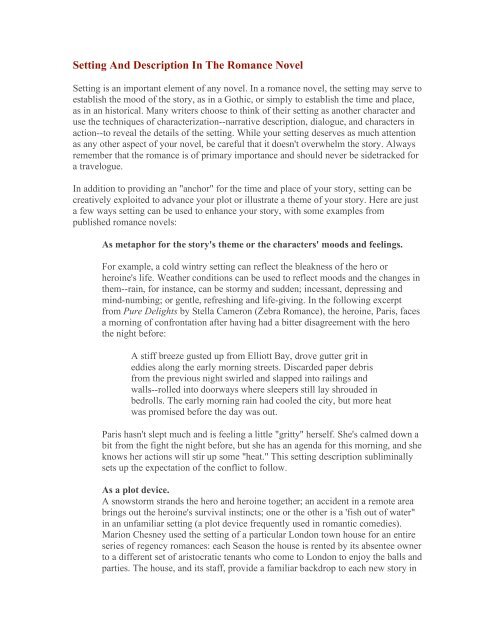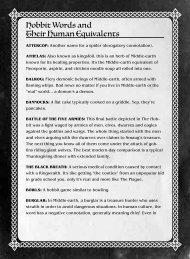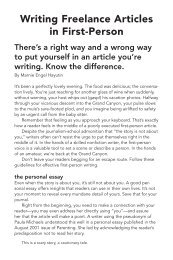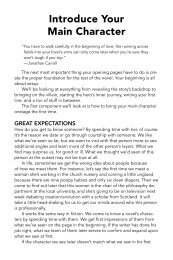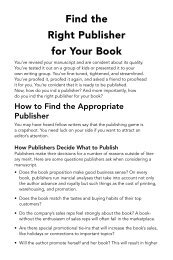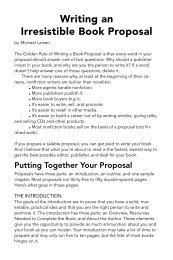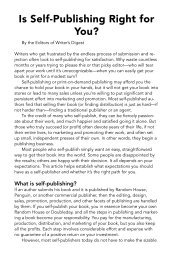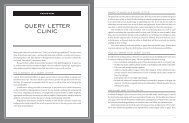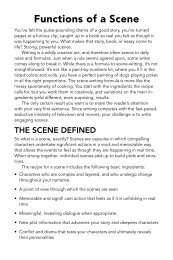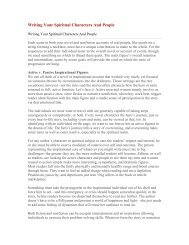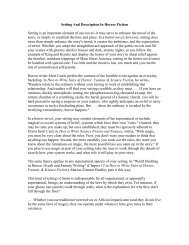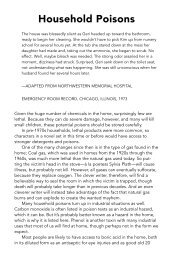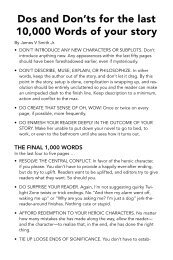Setting And Description In The Romance Novel - Writer's Digest
Setting And Description In The Romance Novel - Writer's Digest
Setting And Description In The Romance Novel - Writer's Digest
- No tags were found...
You also want an ePaper? Increase the reach of your titles
YUMPU automatically turns print PDFs into web optimized ePapers that Google loves.
<strong>Setting</strong> <strong>And</strong> <strong>Description</strong> <strong>In</strong> <strong>The</strong> <strong>Romance</strong> <strong>Novel</strong><strong>Setting</strong> is an important element of any novel. <strong>In</strong> a romance novel, the setting may serve toestablish the mood of the story, as in a Gothic, or simply to establish the time and place,as in an historical. Many writers choose to think of their setting as another character anduse the techniques of characterization--narrative description, dialogue, and characters inaction--to reveal the details of the setting. While your setting deserves as much attentionas any other aspect of your novel, be careful that it doesn't overwhelm the story. Alwaysremember that the romance is of primary importance and should never be sidetracked fora travelogue.<strong>In</strong> addition to providing an "anchor" for the time and place of your story, setting can becreatively exploited to advance your plot or illustrate a theme of your story. Here are justa few ways setting can be used to enhance your story, with some examples frompublished romance novels:As metaphor for the story's theme or the characters' moods and feelings.For example, a cold wintry setting can reflect the bleakness of the hero orheroine's life. Weather conditions can be used to reflect moods and the changes inthem--rain, for instance, can be stormy and sudden; incessant, depressing andmind-numbing; or gentle, refreshing and life-giving. <strong>In</strong> the following excerptfrom Pure Delights by Stella Cameron (Zebra <strong>Romance</strong>), the heroine, Paris, facesa morning of confrontation after having had a bitter disagreement with the herothe night before:A stiff breeze gusted up from Elliott Bay, drove gutter grit ineddies along the early morning streets. Discarded paper debrisfrom the previous night swirled and slapped into railings andwalls--rolled into doorways where sleepers still lay shrouded inbedrolls. <strong>The</strong> early morning rain had cooled the city, but more heatwas promised before the day was out.Paris hasn't slept much and is feeling a little "gritty" herself. She's calmed down abit from the fight the night before, but she has an agenda for this morning, and sheknows her actions will stir up some "heat." This setting description subliminallysets up the expectation of the conflict to follow.As a plot device.A snowstorm strands the hero and heroine together; an accident in a remote areabrings out the heroine's survival instincts; one or the other is a 'fish out of water"in an unfamiliar setting (a plot device frequently used in romantic comedies).Marion Chesney used the setting of a particular London town house for an entireseries of regency romances: each Season the house is rented by its absentee ownerto a different set of aristocratic tenants who come to London to enjoy the balls andparties. <strong>The</strong> house, and its staff, provide a familiar backdrop to each new story in
the series (A House for the Season, St. Martin's Press). <strong>In</strong> <strong>The</strong> Adventuress, thefifth book in the series, the romantic conflict is set up when two individuals bothwant to take up residence in the house for the Season. <strong>The</strong> hero, the Earl ofFleetwood, has already passed the house up once, declaring it "too poky by half. .. not at all suitable," but he has not been able to find other accommodations.But it was a tight-lipped Emily who stood in the front parlour at 67Clarges Street an hour later. <strong>The</strong> fire had not been lit, and theholland covers still lay in a pile in the corner where Rainbird hadthrown them that morning.She rang the bell and waited. <strong>And</strong> waited. After ten minutes, shegave it a savage pull. Rainbird sauntered in and stood looking ather, eyes bright with insolence. . . ."When I have finished tea," said Emily evenly, "I want you and therest of the staff to assemble here. Such impertinence must ceaseimmediately.""Impertinence?" demanded Rainbird, folding his arms and leaningagainst the door jamb. "I-"He broke off as a resounding volley of knocks sounded on thestreet door. He sprang to answer it.<strong>The</strong> Earl of Fleetwood stood on the doorstep."I am come for another look at this place," he said, strolling pastRainbird."<strong>The</strong> house is already taken," cried Rainbird, but Lord Fleetwoodhad already entered the front parlour.He stopped short before the vision that was Emily. . . "Myapologies, ma'am," said the earl. "Am I to understand the house islet?""Yes," said Emily breathlessly. "To me.". . ."<strong>And</strong> are you satisfied with it?""Not quite," said Emily with a baleful look at Rainbird, who wasstaring at the cakes in a most peculiar way. "I find the staff lackingin respect. Pray be seated, my lord."
news and the fights. My sister's boyfriend would sing all thesecrazy songs to her when they were dating."Steve stopped and set the empty mugs on the window ledge. "Hehad a lousy voice, but she loved every off-key word.""What happened? Did he get the girl?""<strong>The</strong>y're married with four grown children and nine grandchildren.My sister says those golden oldies still make her toes tingle and herheart swoon like a teenager's." He gently rocked the swing backand forth.<strong>Description</strong>Background details can be incorporated into your story in three ways: through straightnarration, as description from a character's viewpoint, or incorporated into passages ofdialogue. Our examples above have used all three methods, but to illustrate the pointperhaps more clearly, following are three examples from one story, Elizabeth's Gift byDonna Davidson (a Signet Regency <strong>Romance</strong>)Narration<strong>The</strong> liveried footman carried the ornate silver tray before him with the airof perfect confidence, his aristocratic mien equal to any peer of the realm.White-gloved hands steady, back straight, uniform clean, without a speckof dust or lint to mar the rich, dark green, he upheld the unequaledreputation of the Duke of Standbridge's London servants.A white linen cloth rested squarely in the middle of the tray with itscorners draping over the sides in precise, equal triangles. Gold-trimmedplates held sandwiches, crusts removed, stacked in a decorative heap,filled with meat and cheese, hearty enough for the old man and attractiveenough to tempt the waning appetite of his distracted grandson.Described by a viewpoint characterIf she never saw another Bond Street establishment, she would be happy.No one could possibly need all the clothes she was forced to consider. Sheliked the stringency of the Scottish household and the high-necked,practical gowns she wore. Evidently one changed clothing here every timeone changed direction. Morning dresses, afternoon dresses, riding habits,ball gowns-every occasion must needs have a particular dress andfootwear designated especially for it. On and on it went, and the onlysaving grace was Lady Mowden's defection from her in a feverishdedication to shaping Mariane's wardrobe.
Elizabeth was listening in open-mouthed awe as a clerk displayed thewonders of the shocking new silk drawers--and had agreed to orderingseveral in pink--when she heard a familiar voice.Character dialogueMariane broke into the conversation, exclaiming, "This bouncing aroundis giving me the headache. Cook should take the cream for a ride on thisroad, she would have butter in a thrice.""Eunice turned to Tarr and said, "Do you think we should stop for a while,sir?""No, missus," Tarr quickly disagreed, "this is a bad stretch of road. It's theruts. Our coach's wheels don't match the grooves in the road. No doubt thelocal wagon builder likes a smaller size, like your own town chariotcoming behind us, but the duke's carriage is too big. We're coming on toLeicester where Macadam had a go at the ground and we'll do just fine.Smart man, Macadam, built the roads up high where they'd drain, piled theground with a ditch full of pounded rocks and gravel. Like driving througha park."


